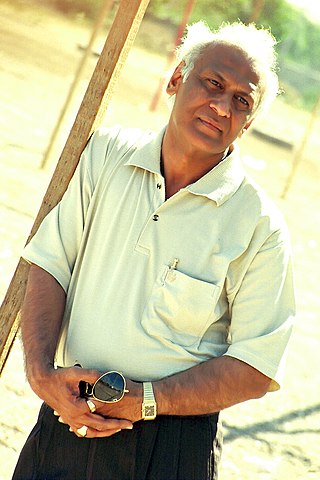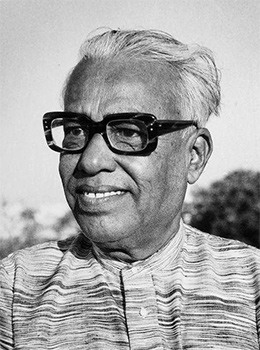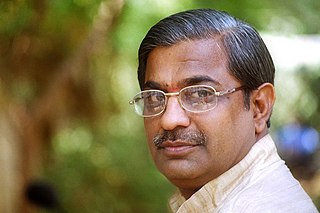Related Research Articles

Jayanta Mahapatra was an Indian poet. He is the first Indian poet to win a Sahitya Akademi award for English poetry. He was the author of poems such as "Indian Summer" and "Hunger", which are regarded as classics in modern Indian English literature. He was awarded a Padma Shri, the fourth highest civilian honour in India in 2009, but he returned the award in 2015 to protest against rising intolerance in India.

Jan Nisar Akhtar was an Indian poet of Urdu ghazals and nazms, and a part of the Progressive Writers' Movement, who was also a lyricist for Bollywood.

K. Ayyappa Paniker, sometimes spelt Ayyappa Panicker, was a Malayalam poet, literary critic, and an academic and a scholar in modern and post-modern literary theories as well as ancient Indian aesthetics and literary traditions. He was one of the pioneers of modernism in Malayalam poetry, where his seminal works like Kurukshethram (1960), is considered a turning point in Malayalam poetry. Many of Ayyappa Paniker's poems and his several essays were an important influence on later generations of Malayalam writers. His poems often reflected his deep concern for the environment with works such as Kadevide Makkale -Malayalam കാടെവിടെ മക്കളെ
Amin Kamil (1924–2014) was a Kashmiri poet.

Sursinhji Takhtasinhji Gohil, popularly known by his pen name, Kalapi was a Gujarati poet and the Thakor (prince) of Lathi state in Gujarat. He is mostly known for his poems depicting his own pathos.

Khwaja Haider Ali Aatish (1764 –1846) of Lucknow was an Urdu poet. Khwaja Haider Ali Aatish Lakhnawi is one of the giants of Urdu literature. Aatish and Imam Baksh Nasikh were contemporary poets whose rivalry is well known. Both had hundreds of disciples. The era of Aatish-Nasikh was a golden era for Urdu poetry in Lucknow. Aatish is mostly known for his ghazals, and for his amazing and different style of poetry.

Akhtar ul Iman was a noted Urdu poet and screenwriter in Hindi cinema, who had a major influence on modern Urdu nazm.

Rajendra Anantrai Shukla is a Gujarati poet. He taught at various places before voluntarily retiring. He published several poetry collections which won him several major Gujarati literary awards.

Sitakant Mahapatra is an Indian poet and literary critic in Odia as well as English. He served in the Indian Administrative Service (IAS) from 1961 until he retired in 1995, and has held ex officio posts such as the Chairman of National Book Trust, New Delhi since then.
Sayyid Sirajuddin, commonly known as Siraj Aurangabadi (1715–1763), was an Indian mystic poet who initially wrote in Persian and later started writing in Urdu.
Nilmani Phookan was an Indian poet in the Assamese language and an academic. His work, replete with symbolism, is inspired by French symbolism and is representative of the genre in Assamese poetry. His notable works include Surya Henu Nami Ahe Ei Nodiyedi, Gulapi Jamur Lagna, and Kobita.

Manoj Khanderia was an Indian poet and a Ghazal writer of Gujarati language.

Ramesh Parekh (1940-2006) was a Gujarati poet and lyricist from Gujarat, India. He was one of the most popular poets of modern Gujarati poetry. Though government servant by profession, he had deep interest in literature and music. He contributed heavily in field of poetry including geet, ghazal and non-lyrical poetry. He also wrote stories and contributed in Gujarati children's literature.

Bhagwatikumar Sharma was an Indian author and journalist who wrote in Gujarati. Born in Surat and educated in languages, he edited a daily for several years. He wrote novels, short stories, poetry, essays and criticism. He received Ranjitram Suvarna Chandrak in 1984 and Sahitya Akademi Award in 1988.
Gulam Rabbani was an Indian lawyer and poet of Urdu literature who wrote under the nom de plume 'Taban'. He wrote several poems in Urdu, especially ghazals, and was known for his works, Zauq-i safar, Nava-e-avara, Poetics to politics and Saz-i larzan. He received the Sahitya Akademi award in 1979 for his work, Nava-e-avara. He was honoured by the Government of India in 1971 with Padma Shri, the fourth highest Indian civilian award.

Abdulgani Abdulkarim Dahiwala, popularly known as Gani Dahiwala was a Gujarati poet.

Rajesh Vyas, better known by his pen name Miskin, is a Gujarati poet from India. Born and brought up in Ahmedabad, he completed his doctorate in Gujarati literature. He writes ghazal poetry and columns in various publications.

Anil Chavda is a Gujarati language poet, writer and columnist from Gujarat, India.

Dhwanil Ravindrabhai Parekh is a Gujarati language poet, critic and playwright from Gujarat, India. His significant works include Dariyo Bhalene Maane, Antim Yuddha and Sanket. He won Yuva Puraskar of Sahitya Akademi, New Delhi for his work Antim Yuddha in 2011. He is also a recipient of Yuva Gaurav Puraskar of 2008 instituted by Gujarat Sahitya Akademi.
Arjan Tanwani, popularly known by his pen name Arjan Hasid, was an Indian Sindhi language poet who had authored seven collections of poems and ghazals. He won the Sahitya Akademi Award in Sindhi in 1985 for his collection of ghazals Mero Siji (1984) and was conferred with the Sahitya Akademi fellowship in 2013, the highest honour of the Sahitya Akademi.
References
- ↑ K.C.Kanda (1995). Urdu Ghazals: An Anthology. Sterling Publishers. pp. 341–343. ISBN 9788120718265.
- ↑ Amreesh Datta (1987). Encyclopaedia of Indian Literature A-D. Sahitya Akademi. p. 375. ISBN 9788126018031.
- ↑ K. M. George (1992). Modern Indian literature: An Anthology. Sahitya Akademi. p. 440. ISBN 9788172013240.